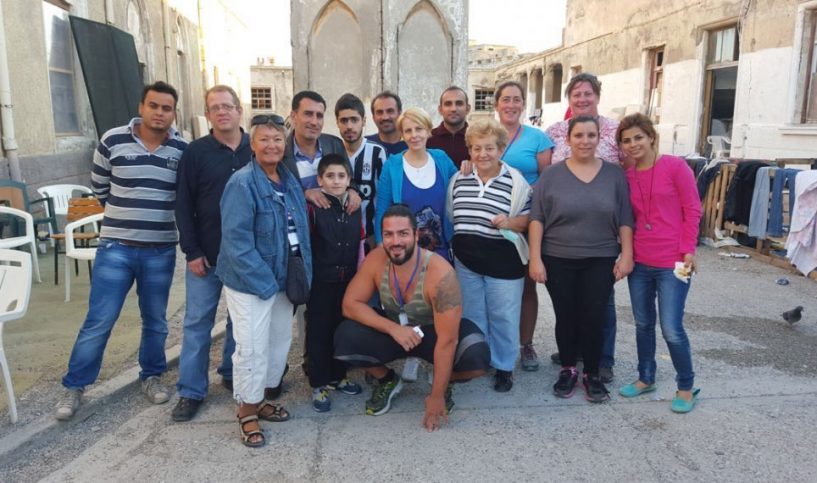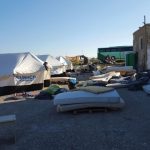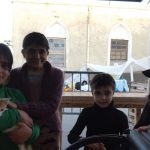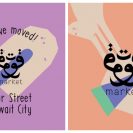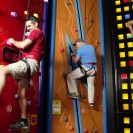If you’ve been keeping up with current events over the past year, you know that the refugee crisis in Europe is getting out of hand. Roughly 800,000 refugees have passed through, journeying to seek asylum this year alone. Awareness is vital in this time as refugees have lost so much and are looking for people to help in whatever way they could. What they really need is the help of fellow Arabs, since many of them only speak Arabic – and are thus left feeling lost and hopeless in their situation.
Enter Suheil Al-Tayea, who found himself volunteering on the Greek island of Rhodes. “After deciding to volunteer, and upon doing my research, finding the right organization to volunteer for was a challenge. I finally got in touch with Helping Hands of Rhodes and they were thrilled that I spoke Arabic and requested for me to come join them right away.”
Suheil spent a month in Greece, helping out refugees in whatever way he could. “There was so much to be done. I arrived at 12am and by 4am they had called me from my hotel asking me to come help load ferries of goods that were being shipped to organizations on other islands. That night, everyone was helping – even people from different organizations.” And this is just the beginning of unity that was shown in the camps. People were helping in all of the different ways that they could: picking up garbage, cleaning the camp, and assisting the refugees in any way possible. From providing comfort and talking to them, to listing their needs, to providing them with places to clean up and shower by inviting them to their hotels for the day – everyone lent a hand.
According to Suheil, the refugees’ living conditions at the camp were pretty rough “It was the bare minimum – they have it better than people on other islands, but they could also be more comfortable.” With bathrooms described as “unusable” and “disgusting”, any memory they might have had of a comfortable life became more difficult to bear with. Places to sleep ranged from vast to sparse, depending on the traffic of refugees at the camp. The UN had provided five tents, fitting one family each. Camping tents had also been donated and spread throughout the camp, providing shelter for as many people as they could fit, and a slaughterhouse converted to a shelter that held 80 beds. At this time, strangers share living spaces and are confined to minimal space. If all spaces were filled, people had to sleep in the open air – with as many donated blankets and pillows volunteers could scrounge and provide them with.
This specific camp was lucky enough to scrounge three meals a day and shelter for the refugees, but this isn’t always the case. Rhodes is the capital of the Greek Islands, but other islands where the refugees had landed from their grueling journey to Europe don’t always offer that type of shelter, since their infrastructure couldn’t handle it. Some refugees have to resort to extremes like sleeping and relieving themselves on the streets. What’s even worse is that these people risk their lives, paying 3,000 Euros a head to smugglers, who carry them on flimsy boats that have no guarantee whether they’ll sink or swim, or that they wouldn’t lose the lives of their children along the way.
People also tend to believe that, because winter is here, the boats will stop coming – but smugglers are now offering “Winter Discounts” at reduced fare, making people risk everything to journey on freezing waters and living in harsh conditions in search of a new – safer – home. They’re seeking asylum from what drove them away from their countries – and being closest to the region, the Greek Islands are only the beginning of their journey. They still have to travel through Macedonia, Slovenia and Croatia to get to European countries like Hungary, Austria and Germany where refugees are being considered for citizenship. What’s extremely unfortunate, is that when they find temporary refuge in islands like Rhodes, Suheil noted that both the refugees and volunteers are asking the same disappointing question: “Where are the Arabs?”
Suheil, the only Arab-speaker amongst the volunteers in Rhodes, revealed a simple answer to this inquiry: the Arabs are volunteering in the more developed nations in Europe, such as Austria and Germany. While it’s great that Arabs are contributing, The Greek islands need our attention. “When I met the refugees and they learned that I could speak Arabic, it was as though I was an angel sent to them from Heaven. Imagine how frustrating it must be for you to try to express what you need but nobody can help you because they don’t speak the language. Having Arab volunteers in Greece would make a world of a difference.”
What can volunteers do? Suheil did everything, including identifying and burying dead bodies at the cemeteries – but volunteers are only asked to do whatever they can handle. Nobody is expecting them to collect dead bodies or to save the world, and no one is expecting people to give up all their time and money to help. “I stayed for a month, but even a week makes a difference! Greek locals would come and help out for a day if they could – there’s no such thing as giving too little, everyone should give what they can.” According to Suheil, the volunteers are in desperate need of interpreters right now, which is why we as Arabs should take the time and effort to help them.
If you’re interested in volunteering at the Greek Islands this year, the process isn’t as difficult as you’d think. If you’re an Arab passport holder, you will need to obtain a visa to enter Greece. Once you have your visa and have set aside time for your trip, contact an organization such as Helping Hands of Rhodes (helpinghandsofrhodes@gmail.com) or Solidarity Symi (http://www.solidaritysymi.org) to notify them of your interest. They’ll pick you up from the airport, give you suggestions for places to stay – your journey as a volunteer begins from there.
But of course, we all have obstacles and commitments in our everyday lives that prevent us from taking such trips – but we could still spread the word. People tend to think that anything they do to help won’t actually help in the long run because it’s a small percentage of effort, but it’s a butterfly effect – it only sparks more incentive for others to give their time to the refugees as well. “I gave a lecture at a school where one of the students’ mothers was a doctor, and the next day she donated two big bags filled with medical supplies!” Word of mouth goes a long way. Talk about it at your diwaniyas and social circles, and you never know how far the effort will go.
To help out, make sure to contact a trusted organization. If you’re interested or inspired, you can contact Helping Hands of Rhodes by emailing them at helpinghandsofrhodes@gmail.com or simply check out Solidarity Symi at www.solidaritysymi.org. For more information contact Suheil via email at altayea@gmail.com, or at 9008 9007.

